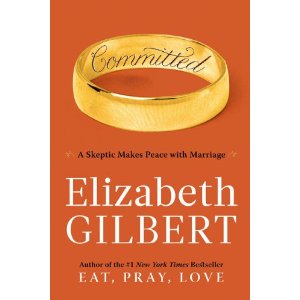Committed: A Skeptic Makes Peace with Marriage, is a book I’ve recently devoured. Written by Elizabeth Gilbert, author of the runaway bestseller, Eat, Pray, Love, it looks at her struggle to figure out how to reconcile her relationship to the institution of marriage (something she had sworn she would never again enter into, but the Department of Homeland Security in the US suggested was necessary if she was to continue her relationship with foreign born Felipe).
I found myself turning over the corners of several pages regarding ideas I thought were significant and thought provoking.

I heard about it from a friend who knew a pastor who, after reading it, decided that if he could only recommend one book to a couple who was about to get married, would recommend this book because of the thoughtful way it “pokes” at our assumptions of this most significant relationship, the most intimate and important one of our lives.
Actually, that was one of the points it made…how significant do we make it, and do we overwhelm the marriage relationship with expectations it was never intended to carry. Does this relationship snap because it carries a stress heavier than it is able to?
Gilbert travels extensively during her quest to “make peace with marriage”, noting in her travels, the curious look she gets when she asks an old Hmong grandmother in Vietnam, “Is your man a good husband?” The woman looks at her, asking her to repeat the questions, it not making sense to her.
The best answer she could come up with was this: Her husband was neither a good husband
nor a bad husband. He was just a husband….[she]had never been taught to expect that her husband’s job was to make her abundantly happy…Her marriage fulfilled its role, performed its necessary
social task, became merely what it was, and that was fine…By contrast, I had always been taught that the pursuit of happiness was my natural (even national) birthright…profound happiness, even soaring happiness. And what could possibly bring a person more soaring happiness than romantic love?….a recent survey of young women found that what women are seeking these days in a husband—more than anything else—is a man who will “inspire” them, which is, by any measure, a tall order. As a point of comparison, young women of the same age, surveyed back in the 1920’s, were more likely to choose a partner basedon qualities such as “decency”, or “honesty”…But that’s not enough anymore. Now we want to be inspired by our spouses! Daily! Step to it, honey!…That our very job description as spouses was to be each other’s everything….For the first time in my life, it occurred to me that I was asking too much of marriage. Perhaps I was loading a far heavier cargo of expectation onto the creaky old boat of matrimony that that strange vessel had ever been built to accommodate in the first place.(excerpted from pages 41-49, bolded marking mine)
That got me to reflecting on the number of couples I have worked with where one partner states, “I’ll never be enough. I can never do enough, say enough, or do it right enough. I’ll always fall short.” These are people that care about and love their spouses, but are so worn out from the feeling of failure and of falling short that they pull away in despair. There is a giving up with the feeling of “If I can’t do it right no matter how hard I try, why try?”
Without realizing it, or intending to, one spouse can unconsciously require their spouse to perform a certain function for themselves. This is unintended and not malicious, but it is also unfair, and unworkable.
It’s not fair to ask another person to fulfill you, to be the one responsible for you to be happy, satisfied, and feeling OK. And not realistic or possible either. When a person NEEDS a spouse to perform a certain role in their lives for their own wellbeing, the relationship has been set up for failure.
I said “set up for failure”, not “destined to be a failure”…with work, these unfair and unrealistic expectations can be made conscious, and a person can work to establish strategies to deal with the parts of themselves that have set this up. These strategies can deal with these wounded parts in ways that are set up to be effective and life giving, allowing the relationship to be freed from these toxic demands. This opens the relationship to new possibilities and freshness that wasn’t possible before. This work includes people looking inside of themselves and between themselves and their spouse.
A marriage can be enriching for each spouse, and it can be a place of healing as a person feels supported and loved. But it was never intended to be a place where the one’s spouse is the sole factor in one’s wellbeing.
I love this poem:
“Let there be spaces in your togetherness, And let the winds of the heavens dance between you. Love one another but make not a bond of love: Let it rather be a moving sea between the shores of your souls. Fill each other’s cup but drink not from one cup. Give one another of your bread but eat not from the same loaf. Sing and dance together and be joyous, but let each one of you be alone, Even as the strings of a lute are alone though they quiver with the same music. Give your hearts, but not into each other’s keeping. For only the hand of Life can contain your hearts. And stand together, yet not too near together: For the pillars of the temple stand apart, And the oak tree and the cypress grow not in each other’s shadow.”
Khalil Gibran (The Prophet)






Write a Comment